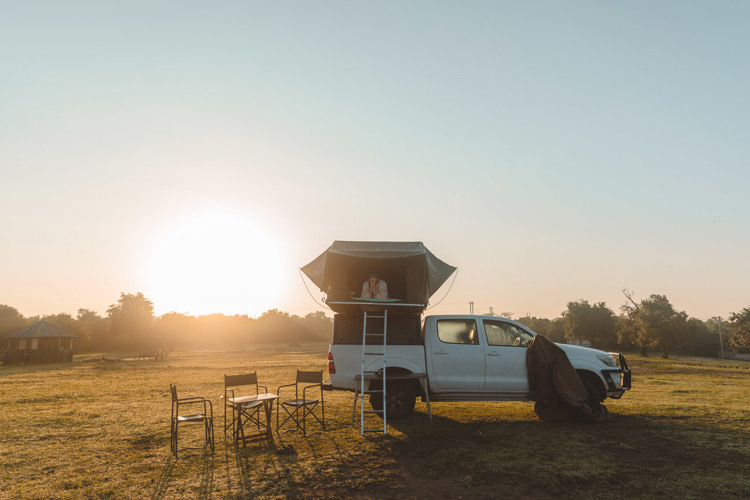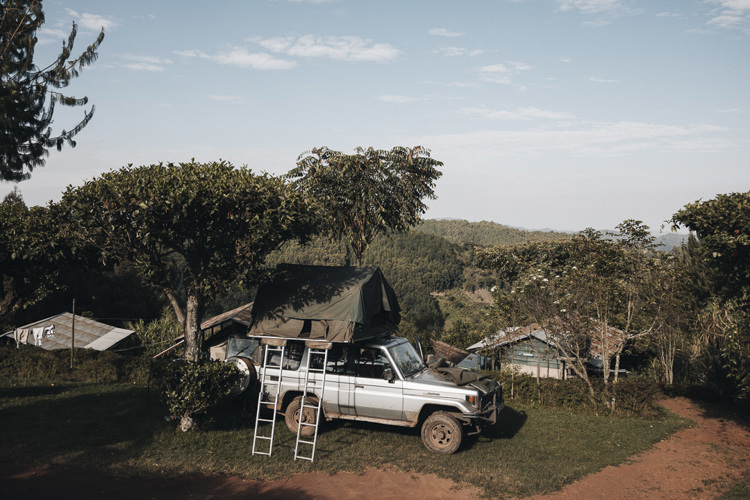Camping in Uganda
Whether you are travelling Uganda on a budget, love the outdoors, or want to stay flexible during your trip - camping and roadtripping with a 4x4 is a wonderful way to explore to country and experience a great sense of freedom.
Did you know that campsites are widely available in Uganda? And that camping in Uganda can easily be done without making a reservation ahead of time? Check out our 10 tips below to make the most out of your camping safari in Uganda!

10 things to know about camping in Uganda
1. Campsites in Uganda - Campsites are widely available in Uganda, ranging from simple national park campgrounds overseen by the Uganda Wildlife Authority (UWA) to private sites managed by lodge owners. Many of these private options offer great amenities, such as on-site restaurants and swimming pools. Moreover, Uganda's pleasant weather means that camping opportunities are available year-round.
2. Camping fees - Spending the night at a UWA public campsite with pit latrine, water, firewood, and ranger security usually costs USD 5,50/per person, per night. Pitching your tent at a privately owned campground costs about USD 10/per person, per night.
3. Wild camping in Uganda - Wild camping is uncommon in Uganda and not allowed.
4. Reserving your campsite in Uganda - Contrary to countries such as Namibia and Botswana, camping inside Uganda's National Parks doesn't require any advance arrangements. The process is straightforward - simply arrive at the park entrance gate and mention you want an overnight permit.

5. Bush camping - Referred to as special campsites, bush camping is not a widespread practice in Uganda. It means getting a permit from the UWA allowing you to pitch your tent on a private spot in a national park with no facilities and no other campers. As far as we know, it is currently only possible to bush camp in Murchison Falls National Park. A bush camping permit, which includes the presence of a ranger, costs USD 40/pp/per night and can easily be arranged on arrival at the gate.
6. Uganda's best campsites - The Bradt Travel Guide is a wonderful travel guide for Uganda and offers detailed and updated information about campsites in Uganda.
7. Apps to use - We advise you to download the free apps Maps.me (for navigation when driving) and iOverlander before travelling to Uganda, almost every campsite is plotted and reviewed.
8. Camping & hippos - If you want to set up camp near a river, keep an eye out for animal paths leading from the riverbank. These are likely hippo trails, as hippos often leave the water at night for grazing. Make sure not to position yourself between the hippos and the water: when hippos get scared they run for water.

9. Setting up camp - Don’t set up your tent underneath a thorn tree, they don’t go well with airbeds....
10. Camping & rubbish disposal - To prevent attracting animals, make sure not to leave food exposed and never leave food inside your tent. Also, do not dispose of leftover food in the bush, thinking it benefits the local animal population If there are no bins around, it's essential that you pack your trash and carry it with you when leaving the campsite.
Getting your supplies when camping in Uganda
All our safari vehicles for rent in Uganda can be equipped to a fully 4×4 camper vehicle. Check the camp gear for hire at Roadtrip Africa.
Setting up your rooftop tent is a quick and easy process, as demonstrated by Muhire and Jackson from the Roadtrip Uganda team.
We understand that eating out in restaurants is good and cheap in Uganda. But personally, we are big fans of cooking in the bush. Messing about and buying groceries at local markets is all part of it, and half the fun if you ask us.
Uganda is very fertile and you can buy lots of tasty fruits and vegetables such as potatoes, tomatoes, pineapples, mango, and passion fruits from small food stalls alongside the road. Many people use Swahili spices in their food, so you can easily stock up on exotic spice melanges containing coriander, ginger, black pepper, nutmeg, cinnamon, etc. Kampala is also home to a lot of well-stocked supermarkets where you can buy all kinds of Western products. Provincial towns, on the other hand, have less variety. However, you should be able to find canned/dried foods like beans, rice, pasta, and noodles as well as eggs, milk, water, and of course… Coca-Cola. Quite impressive how they've organized their distribution with outreach to even the smallest villages deep in rural Africa!
Some final food tips for your camping trip in Uganda:
From Kampala, we always bring chicken stock, canned tuna, olives, capers, coconut milk, parmesan cheese and chorizo (keeps well in warm temperatures for quite a few days). Good olive oil and truffle oil make every salad or pasta taste good. Couscous is easier to prepare than rice. For breakfast, we make sure to bring filtered coffee, muesli, jam and nuts. Pancakes are a good substitute for bread and milk is available everywhere. Bon appetit!
